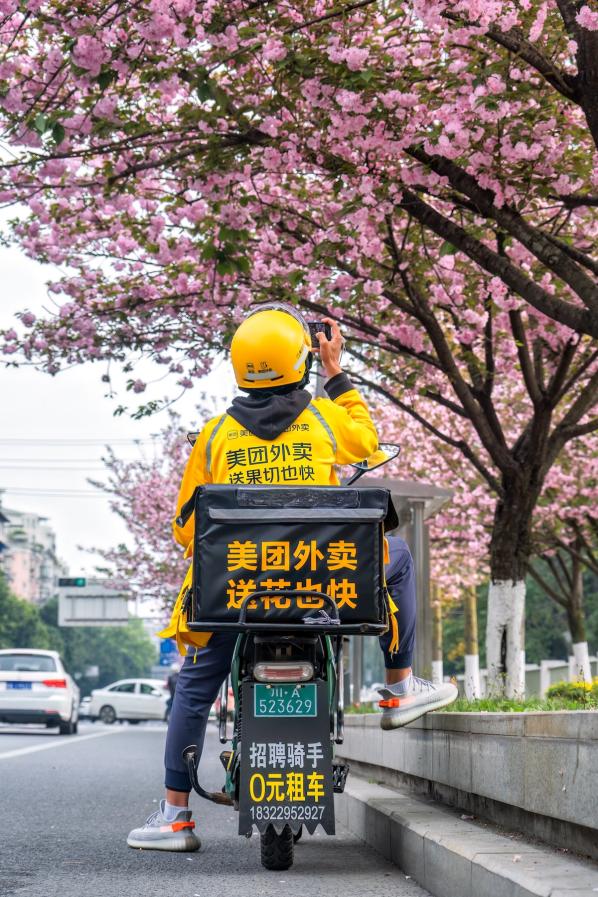
Photograph: B.Zhou / Shutterstock.com
Letter from the Editors
Thanks for being a China Labour Bulletin subscriber! Recently, CLB has been focusing on the changes in China’s manufacturing industry and gig economy, and these two topics are related from a labour pool perspective.
Several years ago, just as China’s manufacturing industry began to shrink, platform companies were growing rapidly and needed a strong labour force to build demand. During the pandemic, food delivery and courier services became essential to customers and provided flexible labour for those newly seeking work. Today, some sectors of the platform economy are becoming saturated with workers while the manufacturing sector is seeing mass layoffs and closures. CLB will be keeping an eye on these and other (un)employment trends.
Our newsletter will be a place where we share what trends we’re seeing and how they affect China’s workers. If you like our content, please share this email with a friend or colleague!
Sincerely,
CLB Editors
What We’re Focusing On
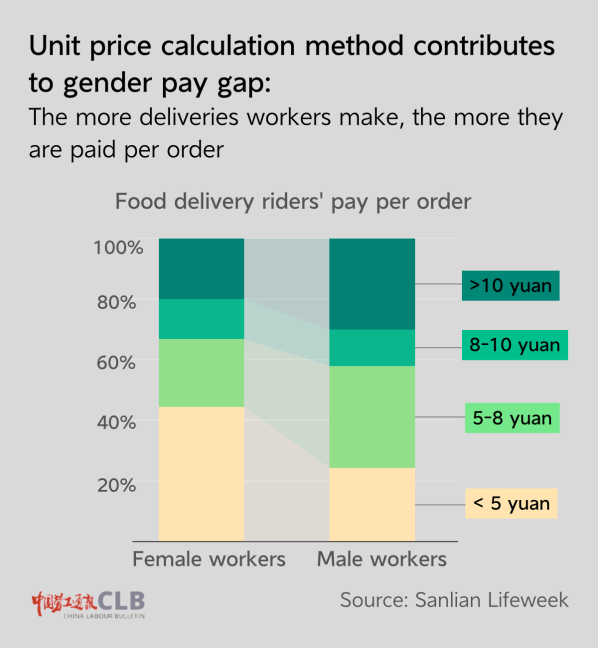
Gender equality. We bring a gender dimension to our recent work on China’s gig economy by understanding how women workers - who make up as much as 20 percent of the labour force in key gig industries - face labour challenges as a result of gender discrimination from society, colleagues and algorithms. This CLB commentary is based on academic research, industry reports, and news articles on the topic. Read our take: Women workers in China’s gig economy face discrimination, lower pay, unsafe conditions.
Supply chains in China. Our researchers analysed the recent trends in China’s manufacturing sector and produced a brief report on how workers are affected by layoffs, relocations, and shutdowns, as well as how CLB envisions that local governments, China’s official trade union, and businesses have aligned interests with workers at a time when international brands are changing their supply chain patterns. Read our analysis: Surge of manufacturing protests in China deserves international attention.
Enough with overwork. An expletive-laced retort by a tech worker to his overbearing manager went viral on the eve of April’s Qingming Festival, and although its veracity cannot be confirmed, the overwhelming public sentiment is that workers are done with overtime and lack of boundaries in the workplace. But do they have enough bargaining power to create change? Read our story, with analysis and context: White-collar workers cheer for underdog standing up to manager against overtime on public holiday.
Strike Action
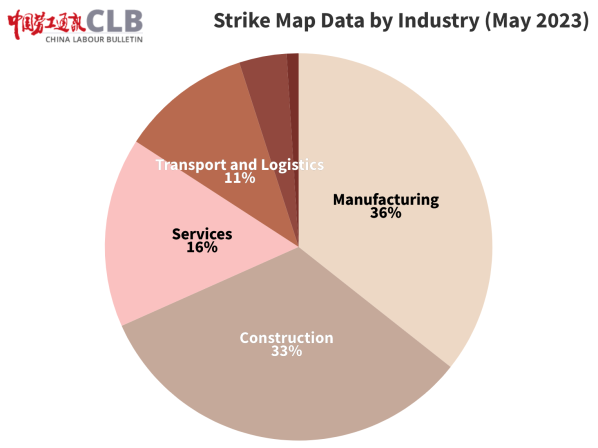
Rising trend of factory worker strikes. According to May 2023 Strike Map data analysis, China’s manufacturing sector is still in turmoil. We recorded 59 factory worker protests, the highest we’ve recorded since 2016, and accounting for 36 percent of all worker collective actions recorded last month.
More unrest at Foxconn factories. On 9 May, Foxconn workers in Zhoukou, Henan province, protested after they were transferred from Shenzhen, and then the mobile phone accessories department in Zhoukou shut down due to lack of orders. On 30 May in Shanghai, Foxconn workers staged a sit-in demanding compensation after a corporate merger, and workers’ demands were soon met. Then, on 9 June, over a hundred Foxconn workers in Shenzhen protested disguised layoffs after the company changed their job assignments and cut wages, and workers demanded compensation under the law for involuntary job termination.
Transport workers strike over low unit prices. In May, Huolala (Lalamove) drivers launched a few strikes in Chengdu, Chongqing, and Liaocheng, Shandong province, to protest falling unit prices. This comes after a nationwide strike in November 2022, also over platform policies that have reduced workers’ earning power.
Food delivery workers protest discriminatory rules at private property. On 25 May, hundreds of Meituan riders in Wenzhou, Zhejiang province, gathered outside an upscale private housing development to protest the property management’s restriction of deliveries to only one gate. This restriction led to riders being fined for late deliveries. Security and riders had physical conflicts, and police were dispatched to the scene.
CLB in the News
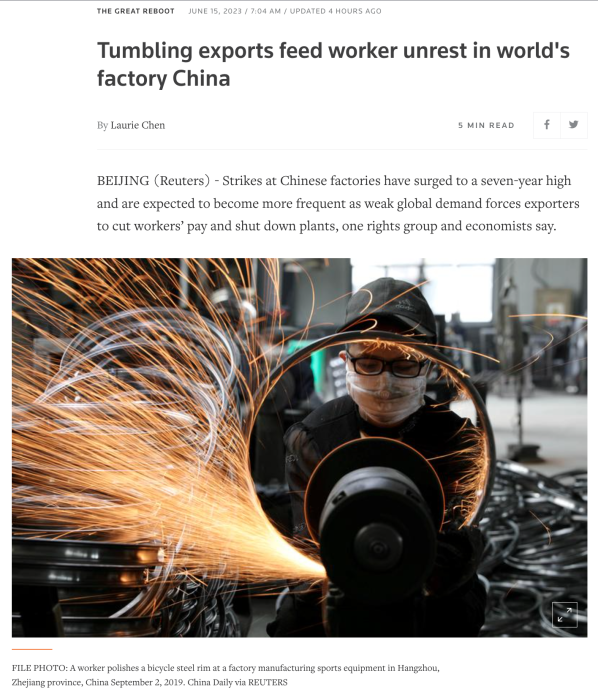
Factory workers go on strike. Our focus on the recent rise in manufacturing sector strikes in China prompted a piece in The Guardian in late May, and in Reuters just today:
“We believe that the drop in manufacturing orders and that factory closures will continue,” said Aidan Chau, researcher at Hong Kong-based rights group China Labour Bulletin (CLB).
“Bosses want to cut costs by simply dumping workers.”
CLB recorded over 140 strikes at factories across the country in the first five months of this year, the highest since the 313 recorded during the same period in 2016.
The rights group’s data is mostly based on protests reported on social media, some of which CLB has been able to verify through contact with unions or the factories, although not all reports are verified.
CLB in Action

Involving brands for real breakthroughs. CLB’s Executive Director Han Dongfang was in Bangkok last week for the United Nations Responsible Business and Human Rights Forum, Asia-Pacific, presenting at a side session on what businesses can do to prevent supply chain risks. His interactive presentation was based on our experience in cooperation with partners in India and our long history working in the China context. Han shared CLB’s vision that collective bargaining doesn't need reinventing; it only needs to include more stakeholders - including international brands. Meaningful participation of brands in dialogues between workers and employers can ensure sufficient transparency on supply chain pricing models and allow all main stakeholders to be able to negotiate as equal partners.
Worker Voices
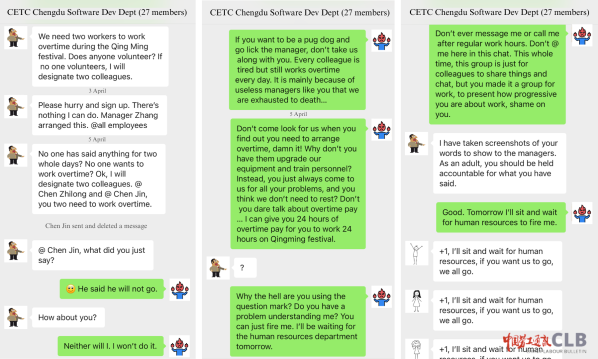
Fed up with overtime. In an unverified text message exchange, a worker stood up to his manager for asking colleagues to work overtime on a public holiday.
If you want to be a pug dog and go lick the manager, don’t take us along with you. Every colleague is tired but still works overtime every day. It is mainly because of useless managers like you that we are exhausted to death… Don’t come look for us when you find out you need to arrange overtime, damn it! Why don’t you have them upgrade our equipment and train personnel? Instead, you just always come to us for all your problems, and you think we don’t need to rest?
CLB Takes
Planned renovation of Shenzhen urban villages temporarily suspended over backlash. In May, tenants in Baimang Village (白芒村) in urban Shenzhen received vacate notices saying they had only one month to move, as their village was subject to renovation under an urban development plan. With its relatively low rent, Baimang has attracted more than 20,000 residents, mostly migrant workers in the manufacturing industry.
Shenzhen’s over 320 square kilometres of urban villages house more than 10 million low-income workers and their families. Shenzhen’s 14th Five-Year Plan (2021-2025) will have the city build 740,000 government-subsidised rental flats to “address housing difficulties for new citizens and young people,” and Baimang is one of the first targets.
In Baimang, the authorities faced great resistance from tenants, who expressed concerns over a range of livelihood issues: the cost of relocation, the likely increase of rent in Baimang and other urban villages, the potential unavailability of schools for their children, and the overall disruption and uncertainty for their futures in the city. For now, the renovation process has been suspended.
The plan fails to take workers’ interests into consideration, and it has implications for migration patterns, the availability of labour in China’s struggling manufacturing industry, and the livelihoods of these workers and families, whether they end up back in Shenzhen or elsewhere after the renovations. What migrant workers need is affordable, safe and decent housing.
Worker Representation

Counselling services for workers threatening suicide over labour rights violations. When circuit board factory workers in Shenzhen went out on strike in late April and dozens went to the factory rooftop threatening to jump, CLB called the Bao’an district trade union and spoke to their psychological counselling department, which is a relatively new unit that not every union has.
We found that this department mostly outsources its work and is not interested in going to the frontlines to relieve pressure on workers. In the official’s own words:
What we can do now is to do a good job of publicity and intervention in the early stages, so our focus is on that part. If workers encounter a crisis situation, we will also go to the scene, but right now, the focus of the work is intervention and publicity - on prevention first - so that these workers will not go to the last resort to jump in this situation.
CLB urged for this department to take a more active role, especially as the manufacturing industry - which is concentrated in Shenzhen and the rest of Guangdong province - is in turmoil, putting high psychological pressure on workers and their families. We said to the union:
We understand that, of course, and we all know that the threat of jumping is a means. They don’t necessarily actually do it, but also we cannot rule out that the conflict will get out of hand. Will the trade union consider taking psychological counselling to the forefront to deal with this new situation? After all, the trade union says it is like the workers' family members and represents workers' interests.
The official responded that she would take our recommendation to her superiors.
Editors’ Recommendations
Workers under pandemic lockdowns. Channel News Asia’s two-part podcast, Red Wall: Inside China’s Zero-Covid World, features interviews with a Foxconn factory worker who fled the Zhengzhou plant in October 2022, and a doctor who signed up to be a pandemic prevention worker taking PCR test samples in Shanghai. The podcast, released earlier this month, sheds light on labour conditions for ordinary people during the pandemic.
